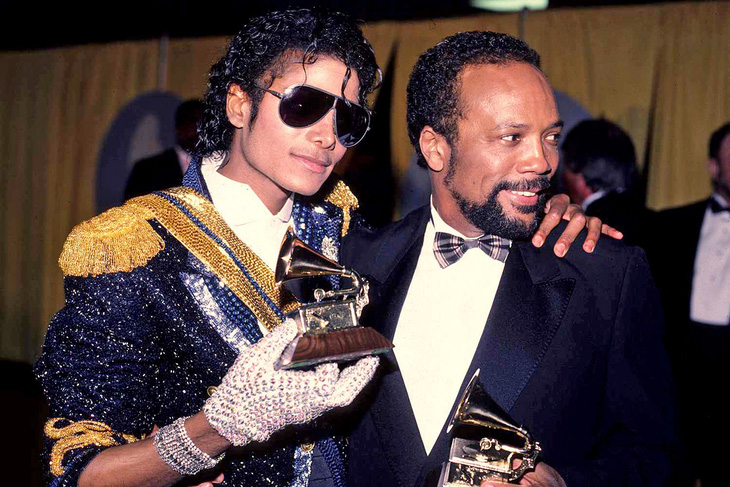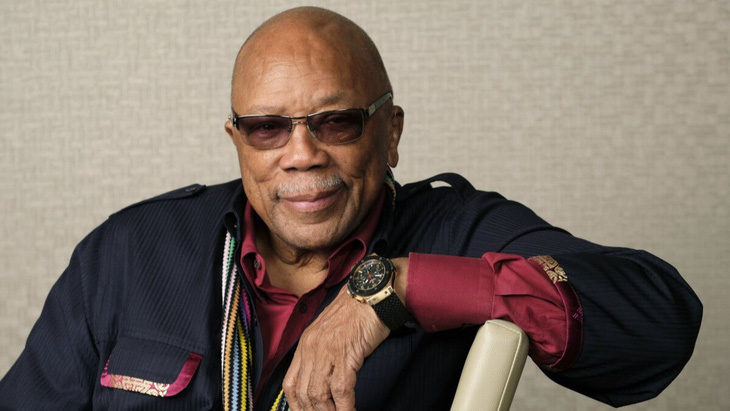Who could go on the news and call The Beatles 'the worst musicians in the world'? Perhaps the only person in the world who could say such a thing without fear of incurring a storm of outrage was Quincy Jones.

Michael Jackson (left) and Quincy Jones at the 1994 Grammy Awards - Photo: PEOPLE
For those who don't know who Quincy Jones is, the 2018 biopic his two children made, which won Best Music Film at the 2019 Grammys, encapsulates his illustrious career in its epilogue:
"Over 2,900 songs recorded, over 300 albums recorded, music for over 51 films and television series, composed over 1,000 pieces of music, nominated for a Grammy 79 times and won 28 times...".
Who else but Quincy Jones?
Who is behind the synthesizer riff and the mysterious, pounding bass that seems to envelop the victim in the classic song Smooth Criminal that made Michael Jackson the King of Pop?
Who was it that introduced the lurking bass line to Michael Jackson's Billie Jean and simultaneously broke all the genre boundaries of R&B, funk, disco, pop? Quincy Jones.
Who is the conductor for the "choir" that sparkles like the Milky Way with Bob Dylan, Stevie Wonder, Michael Jackson, Willie Nelson, Paul Simon, Bruce Springsteen, Tina Turner, Cyndie Lauper... to join in the melody that connects the world together, We Are the World - a peak pop culture moment where music shines like a god descending to earth to save humanity?
Who else but Quincy Jones?
Because only Quincy Jones has the ability to call so many names together. It would not be wrong to say that Quincy Jones is like a friend, a big brother to everyone.
He worked for 70 years.
In those 70 years, the music industry has changed countless times: When Jones was in his twenties, it was the heyday of big band jazz; the rise of soul and rock in the 1960s; the flashy, bouncy disco of the 1970s and 1980s; and then hip hop took over.
But it seems to Jones that music is music and there is nothing new or old.
In 1963, just as British rock 'n' roll artists were beginning to take America by storm, Quincy Jones put pop into jazz standards, helping jazz pianist Count Basie create the album This Time by Basie, bringing the seemingly waning jazz genre back into the musical spotlight.
Then, together with the queen of soul Aretha Franklin, he transformed soul into something completely different in Aretha Now, no longer relying solely on the 12-bar structure of Blues but adding classical elements such as string orchestras, thereby expanding the boundaries of this music genre.
Yet when he worked with Michael Jackson on Off The Wall, one of the most important albums of the 20th century, he once again dressed up soul, only with trendy sounds like disco, like funk.
He jazzified pop music and pop music. But many people populate such complex music and inadvertently trivialize it.
Quincy Jones' greatness lies in the fact that he popularized the genre without trivializing it. He just opened up other possibilities for music.

Quincy Jones
I will use it all up
In Frank Sinatra's early years, he met the still-young Jones, and it was Jones's fiery energy that gave Sinatra a timeless, fresh, upbeat rendition of Fly Me To The Moon.
That arrangement made Sinatra's voice the first song played on the Moon when Apollo 11 landed on the celestial body in 1969.
In the documentary Quincy , Jones calculated: "We only live 26,000 days. And I'll tell you what, I'm going to use them up. If I live to be 80, it'll be 29,000 days. I'm going to use them up."
Quincy Jones died last week at the age of 91. He had over 33,000 days to live, and in 2020, he was still accepting music videos from new-generation rap stars like Travis Scott. He certainly lived up to his promise, living 33,000 days without missing a single day.
Looking at those staggering numbers, it's clear that Quincy Jones is not only the greatest music producer of all time, he's a literal giant.
Source: https://tuoitre.vn/quincy-jones-va-33-000-ngay-dung-den-rach-buom-cuoc-song-20241110090435931.htm






![[Photo] Hanoi morning of October 1: Prolonged flooding, people wade to work](https://vphoto.vietnam.vn/thumb/1200x675/vietnam/resource/IMAGE/2025/10/1/189be28938e3493fa26b2938efa2059e)






























![[Photo] Panorama of the cable-stayed bridge, the final bottleneck of the Ben Luc-Long Thanh expressway](https://vphoto.vietnam.vn/thumb/1200x675/vietnam/resource/IMAGE/2025/9/30/391fdf21025541d6b2f092e49a17243f)




























































Comment (0)